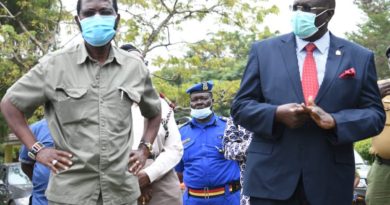Raila Global Corona Call
Hon. Raila Odinga, from @CoalitionNASAKe
Today, the whole world stands where Europe was in 1945. Europe recovered then thanks to massive international assistance. That same attitude of cooperation and solidarity is needed now more than ever before. The determination to keep fascism out of Europe, and the fear of a third world war, jolted the free world into action to save Europe from destitution.
So much help got pumped into West Germany that about a decade after the war, one would have been forgiven for believing that it was Germany that had won World War II. It was not European money that repaired Europe. It was America’s leadership, through the famous Marshall Plan, that got Europe back on its feet again. Today, the whole world stands where Europe was in 1945. The world finds itself in the middle of a grim and disruptive pandemic.
Strangely though, while humanity learnt from the 20th century wars and crafted an international system to deal with their consequences – and to avoid similar devastation in the future – we have responded to COVID-19 as if there has been no precedent. This move needs to be accompanied by a new resolve: that the international system that emerged from the devastation of World War II should be strengthened, not undermined.
The world has no alternative to the United Nations and its support bodies like the World Bank, the International Monetary Fund and the World Health Organization; and to ideals like international security, free markets and democracy. Cooperation, coordination and solidarity should guide the search for vaccines and cures for Covid-19. At the end of World War II, the role of saving Europe and, by extension, the world, passed on to the United States, who – together with the Soviet Union – liberated West Germany.
The US then went ahead to provide the money to rebuild Europe and proceeded to craft an alliance (the North Atlantic Treaty Organisation, or NATO) to help defend Europe. America at that stage showed what is possible when nations cooperate in a spirit of enlightened self-interest. The US, in tandem with Europe, can once again bring the world to one table and lead it into recovery and reconstruction.
Now, more than at any time since World War II, an alliance that brings the entire world to one table to address the health and economic consequences of Covid-19 and to chart a path for tackling similar crises in the future is needed. With leadership at the global level, the post Covid-19 reconstruction period could be the start of something interesting, just like the Marshall Plan led to the formation of NATO and the institutionalization of support for liberation from colonialism.
The US offer of help for Europe came with the requirement that nations get their act together. In Africa, that is a debate already underway. The idea that this continent must act in unison to strengthen its systems with regard to food security, healthcare, infrastructure development, intra-Africa trade and governance is taking root. For instance, the third African Sovereign Wealth and Pension Fund Leaders Forum Covid-19 Roundtable just agreed to redouble efforts to facilitate infrastructure co-investment partnerships with African governments and development finance partners.
The group has its focus on industrial infrastructure related to the African Continental Free Trade Agreement, as well as healthcare and agriculture sectors. In other words, Africa is already organizing itself for post-Covid, just like the rest of the world. But Africa has more issues to be put on the table. It’s going to be extremely problematic for Africa to service its debt and finance reconstruction and recovery at the same time.
There is therefore a need for bilateral and multilateral discussions into debt write-offs and rescheduling for Africa. These efforts require financial, political and diplomatic backing on a global scale. More importantly, they need broad global agreement on how nations are going to relate and transact business post-Covid-19. In this regard, Covid-19 arrived at the wrong time. In recent years, we have seen nations that led or benefited from a globalized approach to world problems retreat from the international stage.
While much has been made of this trend, history tells us that a rethink of such positions is always possible in response to emerging circumstances. t is still possible for the present administrations in Europe and the US to rethink and re-engage with the world. After all, even at the end of World War II, the US was reluctant to involve itself in Europe. With no end or cure in sight, and little knowledge of where the pandemic goes from here, the world is calling for a change of mindset.
Instead of withdrawal, we need engagement on a global, not national scale – no matter what the slogans that leaders used to win power might say. Although all nations have been devastated by this pandemic, that should be a reason for all of us to think beyond our borders, not to retreat. With this disease, no nation is safe as long as one nation is under attack. This is more so as we consider reopening our economies, including international travel and commerce.
Those who have in the past advocated the global system, and those who have benefited from it, must once again champion it, expand its reach and oversee a uniform return to good health for the world. The US and Europe must therefore not build walls to keep the world out. They have to provide leadership, using the institutions firmly under their control, and experience gathered from previous, similar crises.
The US and Europe must therefore not build walls to keep the world out. They have to provide leadership, using the institutions firmly under their control, and experience gathered from previous, similar crises.



